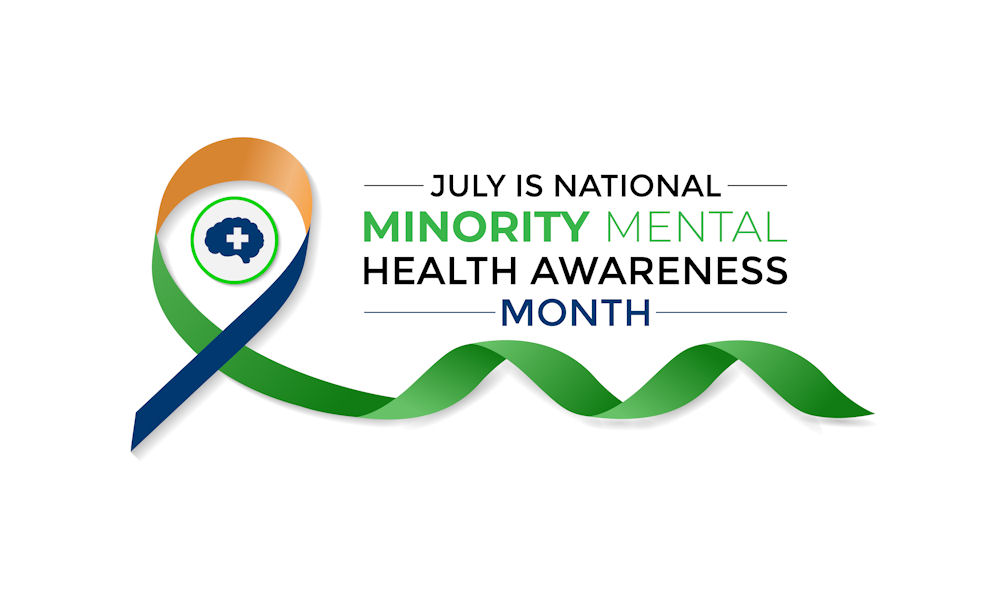July is recognized as Minority Mental Health Awareness Month, an important time to raise awareness about the unique mental health challenges faced by minority communities. It is a month to shed light on the disparities in mental health access and treatment for marginalized populations. By understanding these issues and providing resources and support, we can work towards addressing these disparities and promoting mental wellness for all.
Those struggling with mental health conditions are also at higher risk of developing a co-occurring substance use disorder. Learn how our addiction treatment programs in Washington State can help you or a loved one.
The Importance of Minority Mental Health Awareness
Jump to Section

Minority mental health awareness is crucial because it brings attention to the specific mental health needs and experiences of minority populations. It helps to combat stigma and discrimination that can prevent individuals from seeking help. By promoting awareness, we can create a more inclusive and equitable society where everyone can access quality mental health care.
One significant aspect of minority mental health awareness is recognizing the intersectionality of identities within minority communities. Individuals may face unique challenges due to the combination of their racial or ethnic background, gender identity, sexual orientation, socioeconomic status, and other factors. Understanding these intersections is essential for providing effective and culturally competent mental health support.
Furthermore, minority mental health awareness also involves acknowledging historical and systemic factors that have contributed to disparities in mental health outcomes. For example, communities of color may have experienced trauma and discrimination that impact their mental well-being. Our psychiatric services in Washington consider social determinants of health and advocate for policies that promote equity and justice in mental healthcare.
Understanding the Unique Mental Health Challenges Faced by Minority Communities
Minority communities face a range of unique mental health challenges. Discrimination, racism, and cultural factors can contribute to higher rates of stress, anxiety, and depression. In addition, there may be cultural barriers to seeking help and cultural nuances that impact mental health experiences and perceptions. Understanding these challenges is essential for providing effective support and treatment.
Some unique mental health challenges faced by minority communities include:
1. Lack of access to mental health services
Minority communities often face barriers such as language barriers, cultural stigma, and financial limitations that prevent them from seeking and accessing mental health services.
2. Cultural stigma surrounding mental health
Many minority communities have cultural beliefs and practices that stigmatize mental illness, leading individuals to feel ashamed or embarrassed to seek help. Learn how our support groups in Washington State can help.
3. Historical trauma
Ethnic and racial minorities may have experienced historical traumas such as discrimination, racism, and violence that can lead to long-lasting effects on their mental health.
4. Socioeconomic disparities
Minority communities are more likely to experience poverty, unemployment, and other socioeconomic disadvantages which can contribute to stress, anxiety, and other mental health issues.
5. Racial microaggressions
Constant exposure to subtle forms of discrimination or “microaggressions” can cause significant psychological distress for individuals in minority communities.
6. Language barriers
Individuals in minority communities who do not speak the dominant language may find it challenging to communicate their thoughts and feelings effectively with mental health professionals.
7. Limited representation in the healthcare system
There is a lack of diversity among mental health professionals, making it challenging for individuals in minority communities to find providers who understand their cultural background and experiences.
8. Trauma from immigration experiences
Immigrants and refugees from minority communities may have experienced traumatic events in their home countries or during the immigration process that can impact their mental well-being.
9. Inadequate support systems:
Minority communities often face social isolation due to systemic barriers, which can lead to a lack of social support systems necessary for maintaining good mental health.
10. Higher rates of co-occurring disorders
Members of minority communities are more likely to experience co-occurring disorders such as substance abuse alongside mental illness due to the added stressors they face daily.
Mental Health Statistics in the US and Washington State
When examining mental health in the United States and Washington State, it is evident that minority communities face higher rates of mental health issues. According to national surveys, minority groups, including Black, Indigenous, and Hispanic individuals, are more likely to experience mental health conditions but less likely to receive treatment. In Washington State, these disparities are also present, highlighting the need for increased awareness and access to care.
Addressing mental health inequities requires a multifaceted approach that includes dual diagnosis treatment in Washington State, community outreach programs, and policy changes to improve access to mental health services for all individuals. By recognizing and addressing these disparities, we can work towards a more equitable mental health system that supports the well-being of all members of society.
Resources and Support Available for Minority Mental Health
Fortunately, there are resources and support available to address the mental health needs of minority communities. Organizations such as mental health clinics, community centers, and advocacy groups offer culturally sensitive services and programs. These resources aim to provide education, therapy, and support networks tailored to the unique needs of different minority populations. Individuals and communities must be aware of these resources and utilize them to promote mental well-being.
In addition to these resources, many universities and research institutions are also actively involved in addressing mental health disparities among minority groups. These institutions often conduct studies and develop interventions specifically targeted toward understanding and improving mental health outcomes for marginalized communities. By collaborating with experts in the field, these institutions contribute valuable knowledge and resources to the ongoing efforts to support minority mental health.
Furthermore, governmental agencies at the local, state, and national levels play a significant role in shaping policies and allocating funding to support minority mental health initiatives. Through initiatives such as grant programs, public awareness campaigns, and policy advocacy, these agencies work to reduce barriers to mental health care access and promote culturally competent services. By engaging with policymakers and advocating for equitable psychological services in Washington, minority communities can drive positive change and ensure their voices are heard in the mental health landscape.
Addressing Disparities in Mental Health Access and Treatment for Minorities
To tackle the disparities in mental health access and treatment, it is necessary to take a multi-faceted approach. This involves increasing public awareness, reducing stigma, expanding mental health services in underserved areas, and providing culturally competent care. Additionally, addressing the social determinants of mental health, such as poverty and discrimination, is crucial for creating lasting change. By advocating for equitable policies and promoting diversity in the mental health workforce, we can work towards a more inclusive and accessible mental health care system.
One key aspect of addressing mental health disparities in minority communities is recognizing the unique cultural factors that may influence help-seeking behaviors and treatment preferences. For example, some cultures may prioritize community support and traditional healing practices over Western medical interventions. By incorporating these cultural beliefs into mental health services, providers can build trust and rapport with individuals from diverse backgrounds, ultimately improving treatment outcomes.
It is also essential to consider the intersectionality of identities within minority populations when designing mental health interventions. Factors such as race, ethnicity, gender, sexual orientation, and socioeconomic status can all impact an individual’s mental health experiences and access to care. Tailoring crisis intervention in Washington to address these intersecting identities can help ensure that mental health services are truly inclusive and responsive to the needs of all individuals, regardless of their background.
Initiatives and Campaigns Highlighting Minority Mental Health
Throughout Minority Mental Health Awareness Month, various initiatives and campaigns are organized to raise awareness and promote change. These include workshops, webinars, panel discussions, and public awareness campaigns. By participating in or supporting these initiatives, individuals can contribute to the broader conversation and help drive meaningful action.
One impactful initiative is the creation of safe spaces for individuals from minority communities to share their mental health experiences and seek support. These safe spaces can take the form of online forums, support groups, or community events where individuals feel comfortable discussing their struggles without fear of judgment. By fostering a sense of belonging and understanding, these safe spaces play a crucial role in destigmatizing mental health issues within minority groups.
Additionally, some campaigns focus on advocating for culturally competent mental health services that cater to the specific needs of minority populations. This includes promoting cognitive behavioral therapy (CBT) in Washington that considers cultural backgrounds, languages spoken, and unique challenges faced by individuals from different minority groups. By advocating for culturally sensitive mental health care, these campaigns aim to ensure that all individuals have access to effective and inclusive support systems.
Free By The Sea Can Assist With Mental Health Treatment

One valuable resource for those seeking mental health treatment is Free by the Sea. With our expertise in addiction and mental health services, we offer specialized programs designed to support minority communities. Our culturally sensitive approach ensures that individuals receive the care they need in a supportive and understanding environment.
Free by the Sea’s team of dedicated professionals prioritizes creating a safe and welcoming space where individuals from all backgrounds can feel heard and supported on their journey to mental wellness. Contact us to learn how we can help you!

Dr. Richard Crabbe joined our team in 2019 as our psychiatrist and medical director. He attended the University of Ghana Medical School where he became a Medical Doctor in 1977. From 1978 through 1984, he was a medical officer in the Ghana Navy and provided a variety of services from general medicine to surgeries. He received his Certificate in General Psychology from the American Board of Psychology and Neurology in 2002.

 July 1st, 2024
July 1st, 2024










